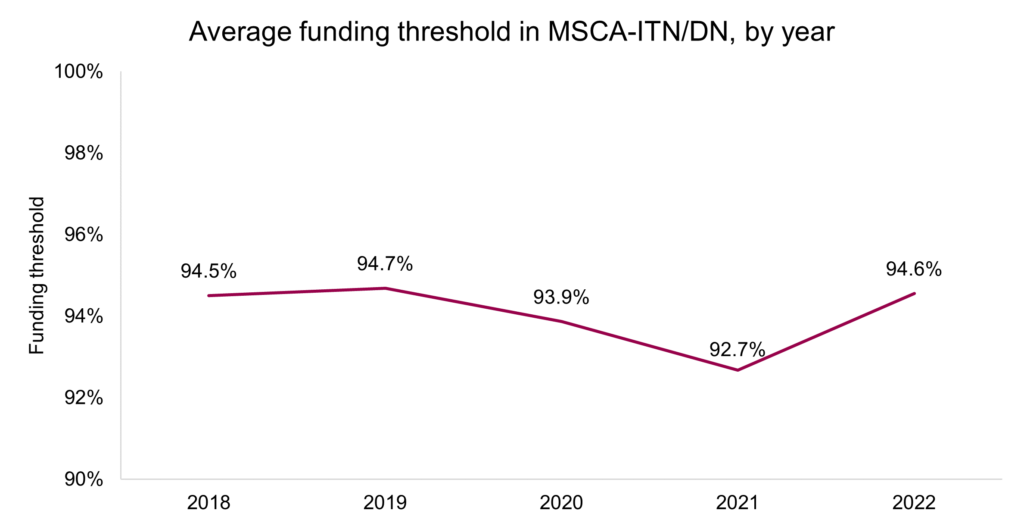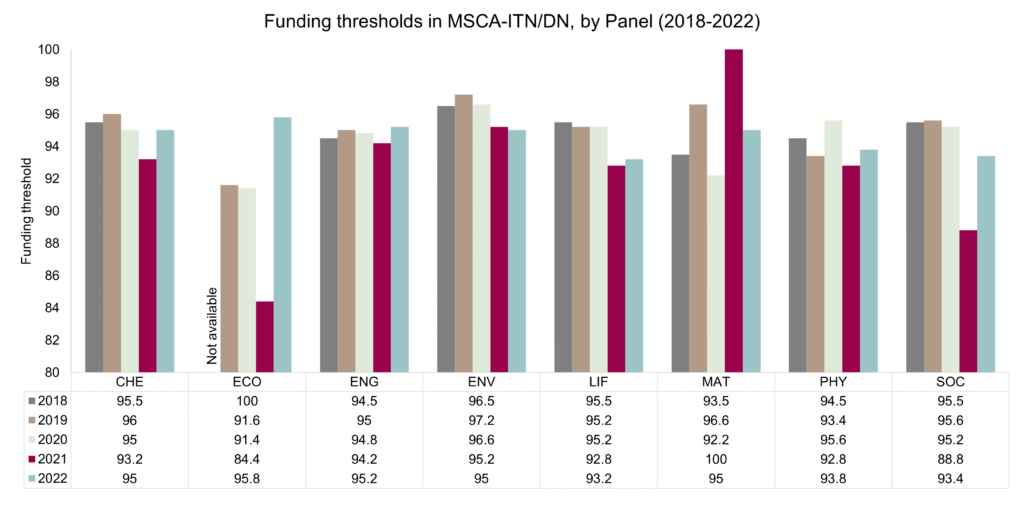Insights into the results of the 2022 MSCA call for Doctoral Networks
21st March 2023 at 5:04 pm
Last week, the European Commission completed the evaluation of the 2022 MSCA Doctoral Networks (DNs) call and published the evaluation results on 16 March 2023.
Of the 946 submitted proposals, 149 were invited for grant preparation, resulting in an overall success rate of 15.8% for the 2022 call. The success rate in the 2022 call is 2.4 percentage points higher than in 2021 (13.4%). This confirms the trend of higher success rates for the MSCA DNs compared to the H2020 calls. The significant increase in the success rate can be most likely attributed to the declining participation in the DN calls. The number of submitted proposals under the Horizon Europe DN calls has significantly decreased since the last H2020 call. In 2020, 1,509 proposals were submitted to the Iast Innovative Training Networks (ITNs) call. In the first Horizon Europe DN call in 2021, the number of submitted proposals went down to 1,076, and in the 2022 call the number fell below 1000 (946). Whether this decrease in interest will stay a trend remains to be seen.

The funding budget for the 2022 call grew compared to last year’s 405 million euro fund. The MSCA now awards 429.4 million euro for the accepted 149 doctoral programmes. Thereof, 47.5 million euro are meant for 14 Industrial Doctorate (DN-ID) programmes, and 43.6 million euro will go to 12 Joint Doctorate (DN-JD) programmes.
The distribution along the scientific panels remains largely the same. Engineering and ICT (33.6%), life sciences (26.2%) and chemistry (12.8%) are still the most popular panels. The numbers are more or less identical to the previous year.
The average funding threshold of 2022 illustrates an increase of 1.9 percentage points from the last call. The average funding threshold of 2022 moves approximately in the same range as the previous average funding thresholds of Horizon 2020.

Compared to the 2021 call, the funding threshold increased in every panel, except the Mathematics (MAT) and Environment & Geosciences (ENV). The funding cut-off score in Mathematics (MAT) dropped from 100 to 95 points in the 2022 call. An increase can further be detected in Social sciences & Humanities, where the funding cut-off score rose by 4.6 points. The funding cut-offs have also increased in Chemistry (CHE) by 1.8 points and Life Sciences (LIF) by 0.4 points, whereas in Engineering (ENG) and Physics (PHY) each increased by 1 point compared to the 2021 call. Out of the 946 proposals submitted, a number of 820 proposals received an evaluation score above the threshold.
On the reserve list?
The figures above do not include proposals that are on the reserve list. Each year, we see the most highly ranked of these proposals moving up to the main list for funding. The lucky ones should be informed in the summer after the EU Grant Agreements with the initially selected proposals are concluded. You can get in touch with your local MSCA National Contact Point, which should have access to the ranking list.
Next deadline
Has your proposal been rejected? Or did you miss the last deadline? The next call will open on 30 May 2023 with a deadline on 28 November 2023. If you intend to resubmit your proposal, please note that applications that received a score below 80 the previous year are not eligible for resubmission.
Want to stay informed?
We regularly publish blog posts on Doctoral Networks and many other Horizon Europe and funding topics. You can subscribe to our blog updates on our blog main area.
How can accelopment support your DN project?
Continuing our success from Horizon 2020, we are pleased to be already involved in the five ongoing Horizon Europe DNs SYNSENSO, MIRELAI, MITGEST, BREAKthrough and CONcISE. Part of this achievement results from our long-standing experience in supporting and partnering with ITNs since FP7. Our success has continued in Horizon 2020 with several completed and the ongoing AGePOP, CAPSTONE, CONSENSE, InPharma, MORE, MOSAICS, MUSIQ and NATURE-ETN projects.
In these ITNs and DNs, we provide professional assistance with Project Management, communication activities and dissemination measures. Additionally, we contribute to their training programmes with our transferable skills courses on research project management, science communication, data management, gender equality, funding opportunities and grant writing.
If you are interested in our support for your newly-funded DN project, contact our ITN/DN expert Jacqueline Strehler.

Jacqueline Strehler
Research & Innovation Project Manager
